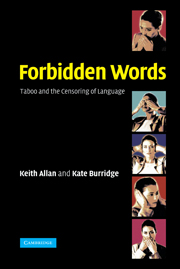Book contents
- Frontmatter
- Contents
- List of figures
- Acknowledgements
- 1 Taboos and their origins
- 2 Sweet talking and offensive language
- 3 Bad language? Jargon, slang, swearing and insult
- 4 The language of political correctness
- 5 Linguistic purism and verbal hygiene
- 6 Taboo, naming and addressing
- 7 Sex and bodily effluvia
- 8 Food and smell
- 9 Disease, death and killing
- 10 Taboo, censoring and the human brain
- Notes
- References
- Index
5 - Linguistic purism and verbal hygiene
Published online by Cambridge University Press: 03 December 2009
- Frontmatter
- Contents
- List of figures
- Acknowledgements
- 1 Taboos and their origins
- 2 Sweet talking and offensive language
- 3 Bad language? Jargon, slang, swearing and insult
- 4 The language of political correctness
- 5 Linguistic purism and verbal hygiene
- 6 Taboo, naming and addressing
- 7 Sex and bodily effluvia
- 8 Food and smell
- 9 Disease, death and killing
- 10 Taboo, censoring and the human brain
- Notes
- References
- Index
Summary
In this chapter we explore popular perceptions of language, in particular linguistic prescription. Speakers' concerns for the well-being of their language lead to puristic activities and linguistic censoring. Puristic attitudes are driven by an ideology of the standard language, so we devote a good part of our discussion to the concept of language standardization and aspects of the creation and cultivation of Standard English. We focus not on formal acts of censorship such as might be carried out by a language academy, but on the attitudes and activities of ordinary people, in letters to newspapers or comments on talkback radio. In these contexts, ordinary language users act as self-appointed censors and take it upon themselves to condemn language that they feel does not measure up to the standards they perceive should hold sway. We argue that the struggle to define ‘the boundless chaos of a living speech’ (as Samuel Johnson wrote in the Preface to his dictionary) and force it into the neat classificatory systems of a standard is part of the human struggle to control unruly nature.
Setting the scene
Like other tabooing practices, language purism seeks to constrain the linguistic behaviour of individuals by identifying certain elements in a language as ‘bad’. Typically, these are words and word usage that are believed to threaten the identity of the culture in question – what eighteenth-century grammarians referred to as the ‘genius’ of the language.
- Type
- Chapter
- Information
- Forbidden WordsTaboo and the Censoring of Language, pp. 112 - 124Publisher: Cambridge University PressPrint publication year: 2006
- 1
- Cited by



